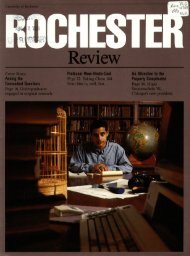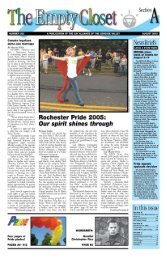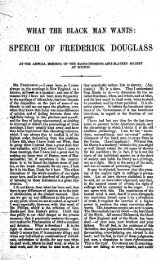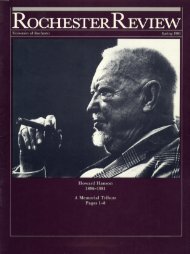Download PDF - University of Rochester Libraries
Download PDF - University of Rochester Libraries
Download PDF - University of Rochester Libraries
You also want an ePaper? Increase the reach of your titles
YUMPU automatically turns print PDFs into web optimized ePapers that Google loves.
Inauguration<br />
Walter I. Garms gets a handshake and a plaque from President Sproull (at lectern) on the<br />
occasion <strong>of</strong> his recent inauguration as dean <strong>of</strong> the Graduate School <strong>of</strong> Education and Human<br />
Development. The third member <strong>of</strong> the trio is Faculty Marshal Richard F. Eisenberg '45,<br />
'48G, associate pr<strong>of</strong>essor in the College <strong>of</strong> Engineering and Applied Science, who as <strong>University</strong><br />
marshal carries the mace at ceremonial <strong>University</strong> functions. A nationally known<br />
authority on educational financing and administration, Garms has been a member <strong>of</strong> the<br />
<strong>Rochester</strong> faculty since 1972.<br />
African visit<br />
President Sproull was in Africa last<br />
fall as a member <strong>of</strong> a delegation that<br />
was, among other concerns, charged<br />
with investigating ways <strong>of</strong> sharing<br />
U.S. technical, scientific, and educational<br />
expertise with developing countries<br />
in that continent.<br />
The twenty-eight-member delegation<br />
was headed by President<br />
Carter's Science Adviser, Frank<br />
Press, and included heads <strong>of</strong> such<br />
federal agencies as the National<br />
Science Foundation and the National<br />
Institutes <strong>of</strong> Health. Sproull and<br />
Harold Enarson, president <strong>of</strong> Ohio<br />
State <strong>University</strong>, represented private<br />
and public universities, respectively.<br />
In reporting about the visit,<br />
Sproull said, in part:<br />
"The result <strong>of</strong> our trip was both<br />
encouraging and sobering. It seems<br />
clear that not all <strong>of</strong> the fifty countries<br />
in sub-Saharan Africa are likely to<br />
survive with independent and<br />
democratic governments, or to attain<br />
such if they do not already have<br />
them.<br />
"There are particular reasons why<br />
the four we visited [Nigeria, Zimbabwe,<br />
Kenya, and Senegal] can<br />
become especially strong and why the<br />
United States should be a part <strong>of</strong><br />
that strengthening. Each <strong>of</strong> the countries<br />
has its own special opportunities;<br />
each has its special and<br />
serious problems."<br />
22<br />
Birds <strong>of</strong> a feather<br />
Why do certain birds prefer to feed<br />
in groups? And what determines the<br />
size <strong>of</strong> those groups? These are questions<br />
Thomas Caraco, assistant pr<strong>of</strong>essor<br />
<strong>of</strong> biology, has been asking<br />
himself.<br />
By observing the behavior <strong>of</strong> a<br />
group-feeding bird, the yellow-eyed<br />
junco, over long periods <strong>of</strong> time,<br />
Caraco has been able to develop<br />
mathematical models that predict the<br />
size <strong>of</strong> such groups under a given set<br />
<strong>of</strong> conditions. He found that as flock<br />
size increases, each bird is able to<br />
spend less time on the lookout for<br />
predators (in this case, mainly hawks)<br />
and more time on feeding. However,<br />
aggressive behavior and territoriality<br />
tend to increase, keeping the flock<br />
size in check.<br />
Environmental factors, such as<br />
temperature and food density, also<br />
playa role. Temperature is critically<br />
important: Birds must eat more in<br />
cold weather to maintain their body<br />
heat, so they have less time available<br />
for aggression. Thus, as the weather<br />
grows colder, the flocks grow larger.<br />
By studying such simple animal<br />
groupings, using mathematical<br />
models, ecologists hope to develop<br />
techniques for analyzing the interactions<br />
within more complicated animal<br />
societies.<br />
William F. May '37<br />
New pr<strong>of</strong>essorship<br />
The William F. May Pr<strong>of</strong>essorship<br />
in Engineering has been established<br />
at the <strong>University</strong> with support from<br />
the American Can Company Foundation<br />
in honor <strong>of</strong> William May,<br />
recently retired chairman <strong>of</strong> the<br />
board <strong>of</strong> the corporation. A Phi Beta<br />
Kappa graduate <strong>of</strong> the <strong>University</strong>'s<br />
class <strong>of</strong> 1937, May is chairman <strong>of</strong> the<br />
executive committee <strong>of</strong> the <strong>University</strong>'s<br />
Board <strong>of</strong> Trustees and chairman<br />
<strong>of</strong> the Trustees' Visiting Committee<br />
for the College <strong>of</strong> Engineering<br />
and Applied Science.<br />
May joined American Can Company<br />
in 1938 as a laboratory technician.<br />
Following his retirement from<br />
the company in October, he became<br />
dean <strong>of</strong> the New York <strong>University</strong><br />
Graduate School <strong>of</strong> Business.<br />
A national leader in cultural,<br />
business, and philanthropic organizations,<br />
May holds the National Conference<br />
Brotherhood Award <strong>of</strong> the<br />
National Conference <strong>of</strong> Christians<br />
and Jews, the Humanitarian Award<br />
<strong>of</strong> the Association for the Help <strong>of</strong><br />
Retarded Children, and the National<br />
Collegiate Athletic Association<br />
Award.<br />
He has served on numerous<br />
boards, including those <strong>of</strong> New York<br />
City's Lincoln Center for the Performing<br />
Arts, the United Nations<br />
Association <strong>of</strong> the United States, the<br />
American Museum <strong>of</strong> Natural<br />
History, the Council for Financial<br />
Aid to Education, and the Committee<br />
for Economic Development.
















